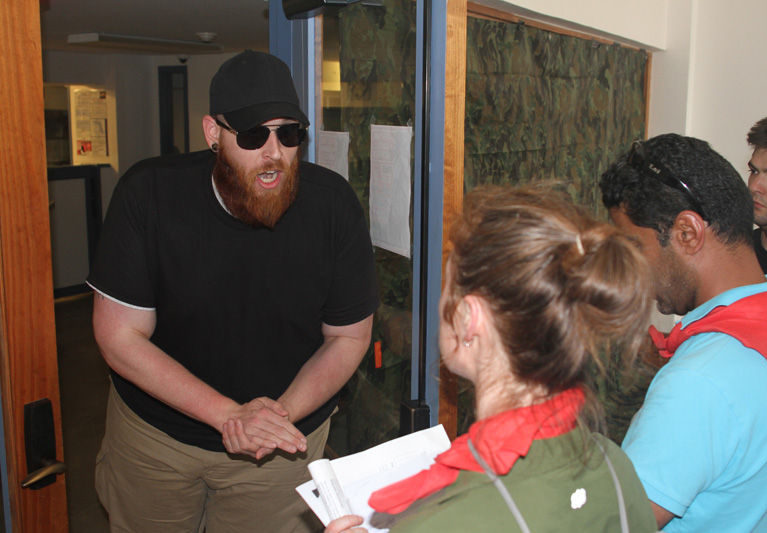
Earlier this month, dozens of college graduate students, Army Reservists and volunteers descended on Fellsmere, taking over Operation Hope as its base of operations. They were there with on a mock mission – to assist in peace keeping and provide humanitarian aid to a conflict zone that had suffered a massive earthquake.
Of course, Fellsmere is hardly a conflict zone. And Indian River County isn’t exactly prone to earthquakes. But, nonetheless, organizers felt Fellsmere was the right place to run a simulated training exercise.
The program is run by the Forage Center for Peacebuilding and Humanitarian Education and is an extension of course studies at various colleges that include conflict resolution, peacebuilding and humanitarian assistance.
The realistic training takes grad students out of the classroom and away from their textbooks and places them in carefully designed scenarios they could face if they were to partner with humanitarian relief groups and other such agencies.
“It’s better to find out in a safe environment,” board member Peter Reynolds said of putting students in field-based experiential training. He added that volunteers are no good if they’re dead – highlighting the importance of the training and ensuring that the students would know what to do and how to conduct themselves in danger zones.
He was not concerned that such training could potentially scare off volunteers.
“If you weed them out now, they won’t get hurt later,” Reynolds said.
Students arrived on a Friday from around the nation, hailing from such universities as George Mason, Tulane, Kennesaw State, and Nova Southeastern. They joined members of the U.S. Army Reserve A Company/436th Civil Affairs Battalion, some of whom have served tours in the Middle East.
Sgt. Garrett Castor, of Tampa, was among those in the Battalion approached by Forage to participate in the training. He jumped at the chance, as did Pvt. Raheem McFarlane, of Orlando.
Both men said they would have spent the weekend working their non-military jobs if not for the opportunity in Fellsmere.
Having worked with NGOs – Non-Governmental Organizations – before, Sgt. Castor said he could see the benefit of having volunteers go through the training exercise.
“It’s a game-changer,” he said, adding that the volunteers would certainly make mistakes, but they’d be able to learn.
The Army Reservists played various roles in the training, including as U.S. and local military personnel, insurgents, and civilians.
“That probably would be fun,” Pvt. McFarlane said of playing the different roles and seeing the positions from a different perspective.
After three days of training, Forage Center board member and Fellsmere Police Det. Larry Lawson declared the event a “tremendous success.”
He said the students were pleased with the experience and the interaction with the police and Army.
“This one was fairly flawless,” Lawson said of the training. He has previously led three other training exercises in Macedonia – a country that borders Greece – over the last few years. Offering the training in the US might not provide the full effect of being so far from home, but it is a “darn sight cheaper,” Reynolds said, noting that students paid $550 to participate.
Lawson said he expects the Forage Center to return to Fellsmere again for its next training exercise, which they plan to do at least once per school year.
“We’re teaching people to care for others,” he said. “Is there anything more important than that? I don’t think so.”



